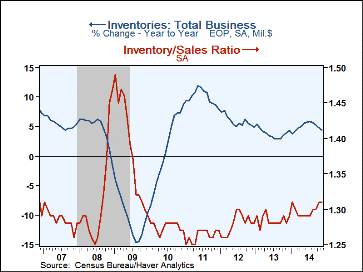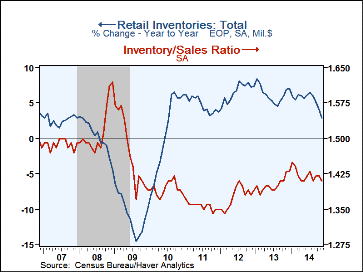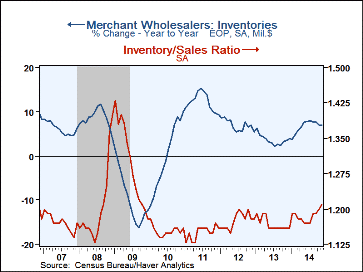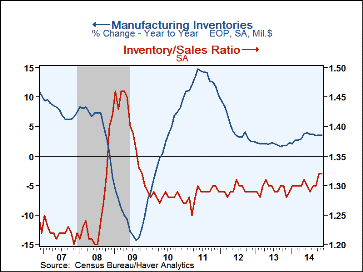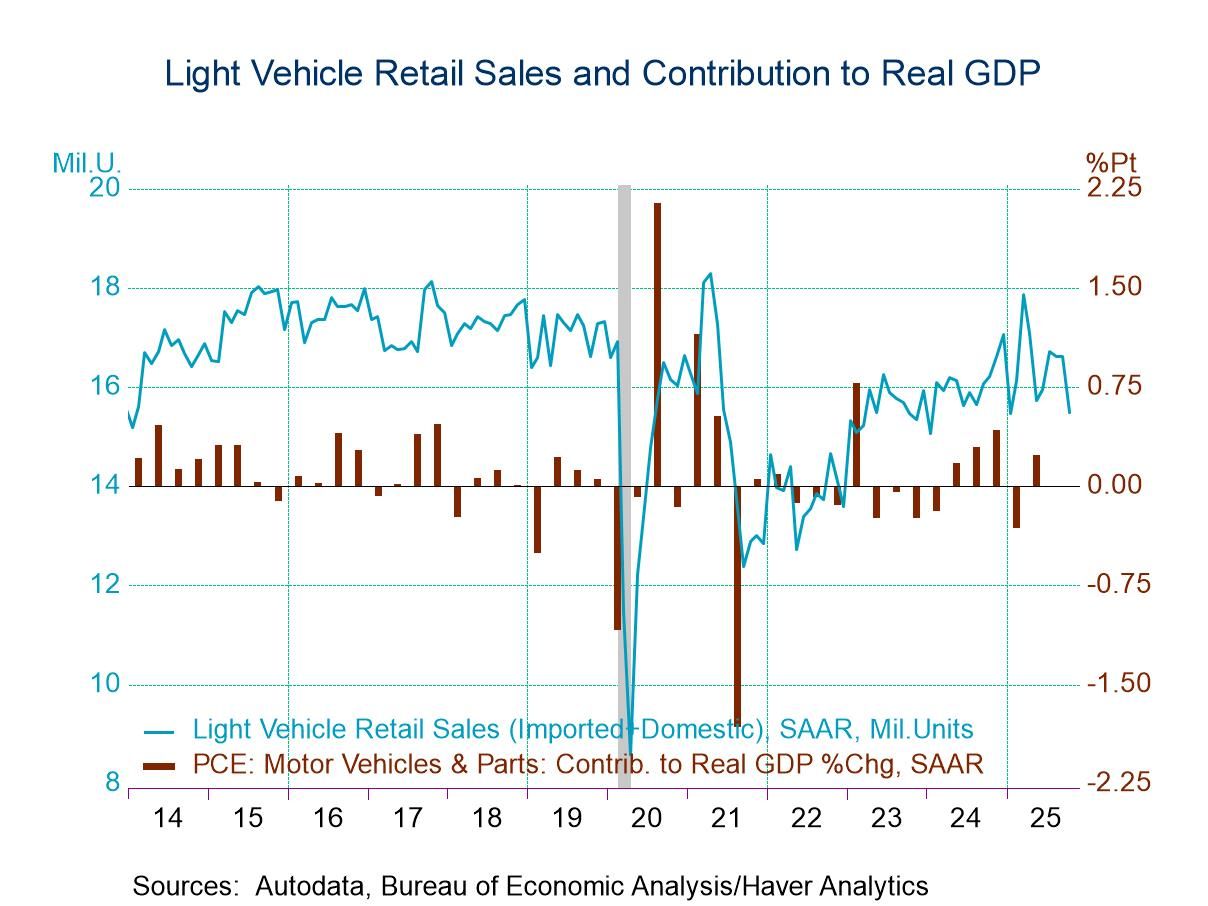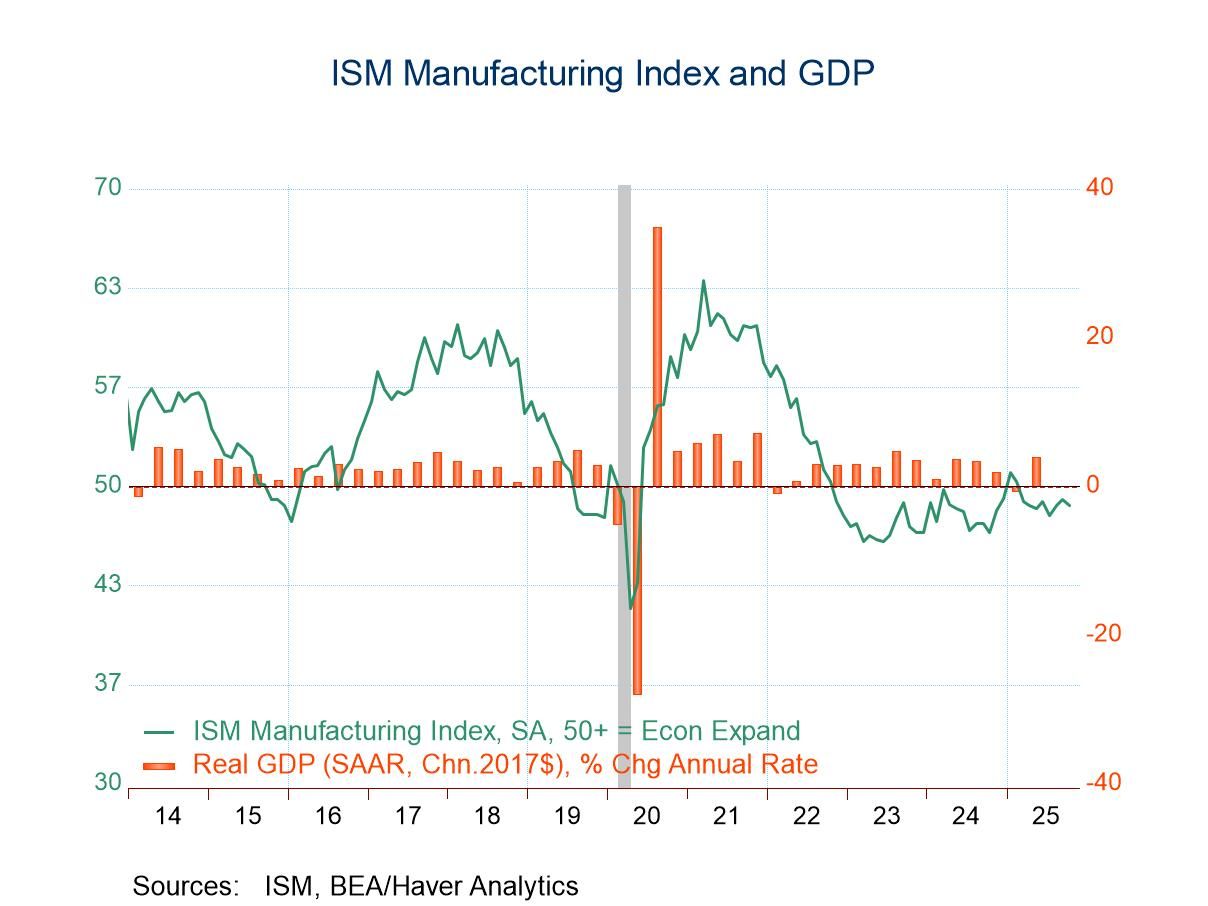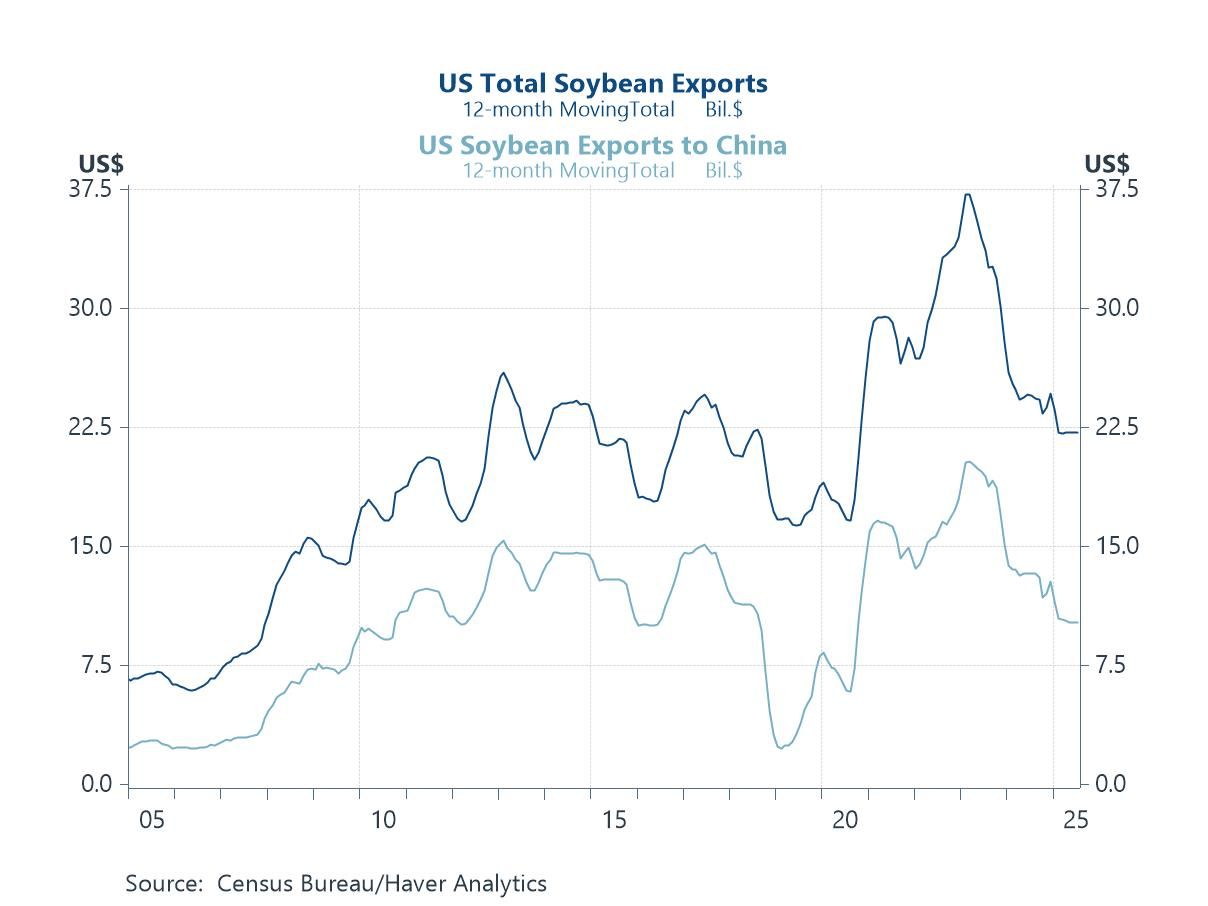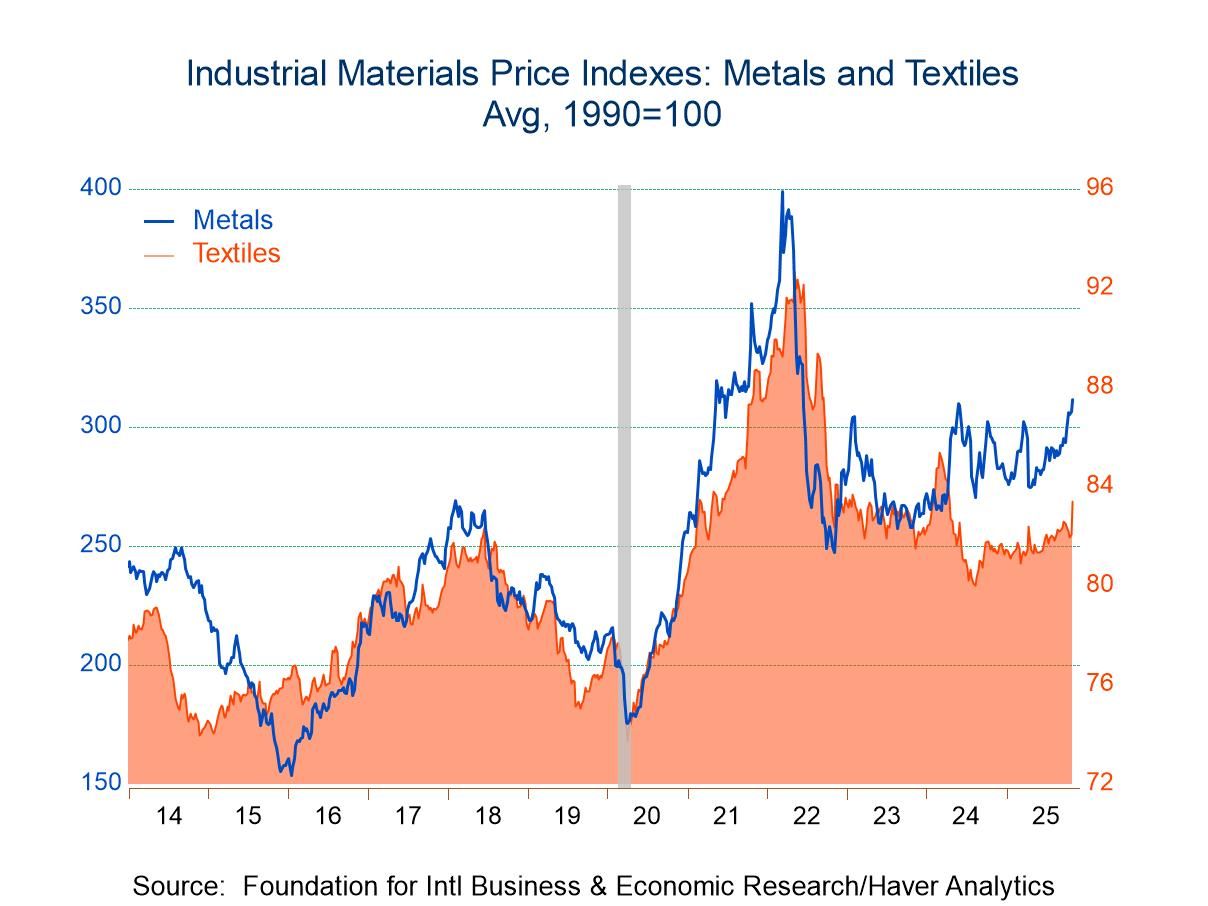 Global| Jan 14 2015
Global| Jan 14 2015U.S. Business Inventory Growth Is Stable Though Sales Decline, Again
by:Tom Moeller
|in:Economy in Brief
Summary
Total business inventories rose 0.2% in November (4.4% y/y), the same as in October, which was unrevised. Total business sales edged down 0.2% (+2.2% y/y) following a deepened 0.3% decline. The resulting inventory/sales ratio for [...]
Total business inventories rose 0.2% in November (4.4% y/y), the same as in October, which was unrevised. Total business sales edged down 0.2% (+2.2% y/y) following a deepened 0.3% decline. The resulting inventory/sales ratio for November remained at a firmer 1.31 for a second month.
By sector, retail inventories declined 0.3% (2.9% y/y) in November after no change during October, revised from 0.2%. Motor vehicle & parts dealers' inventories declined 1.2% (+3.4% y/y), following a 0.5% drop. Retail inventories excluding motor vehicles ticked up 0.1% (2.6% y/y) after a 0.3% increase in October. Among other retailers, building materials inventories fell 0.4% (+3.0% y/y) but general merchandise stores gained 0.4% (1.5% y/y). Inventories at food stores were unchanged (2.4% y/y) as were inventories at clothing stores (2.4% y/y). Inventories at furniture stores jumped 1.2% (2.8% y/y) after a 0.7% decline. Wholesale inventories gained 0.8% (7.1% y/y) while manufacturers' inventories edged up 0.1% (3.6% y/y).
Total business sales, as noted, eased by 0.2% in November (+2.2% y/y) for the fourth consecutive month of decline. Retail sales gained 0.4% (4.5% y/y) but wholesale sales fell 0.3% (+2.4% y/y). Factory shipments declined 0.6% (+0.2% y/y).
The total business inventory-to-sales ratio remained at 1.31 m/m. Retailers ratio edged lower to 1.41 but wholesale ratios rose to 1.21. Manufacturers' I/S ratio held at 1.32.
The manufacturing and trade data are in Haver's USECON database.
| Manufacturing & Trade (%) | Nov | Oct | Sep | Nov Y/Y | 2013 | 2012 | 2011 |
|---|---|---|---|---|---|---|---|
| Business Inventories | 0.2 | 0.2 | 0.3 | 4.4 | 4.3 | 4.9 | 7.9 |
| Retail | -0.3 | 0.0 | 0.2 | 2.9 | 7.1 | 7.4 | 3.7 |
| Retail excl. Motor Vehicles | 0.1 | 0.3 | 0.2 | 2.6 | 3.8 | 3.2 | 3.5 |
| Merchant Wholesalers | 0.8 | 0.6 | 0.4 | 7.1 | 4.0 | 5.5 | 9.2 |
| Manufacturing | 0.1 | 0.1 | 0.2 | 3.6 | 2.3 | 2.4 | 10.2 |
| Business Sales (%) | |||||||
| Total | -0.2 | -0.3 | -0.0 | 2.2 | 3.4 | 4.5 | 10.9 |
| Retail | 0.4 | 0.2 | -0.2 | 4.5 | 4.3 | 5.0 | 7.7 |
| Retail excl. Motor Vehicles | 0.1 | 0.2 | 0.1 | 3.8 | 3.0 | 4.0 | 7.1 |
| Merchant Wholesalers | -0.3 | -0.0 | 0.0 | 2.4 | 4.3 | 4.8 | 12.4 |
| Manufacturing | -0.6 | -0.9 | 0.1 | 0.2 | 2.0 | 4.0 | 12.1 |
| I/S Ratio | |||||||
| Total | 1.31 | 1.31 | 1.30 | 1.28 | 1.28 | 1.28 | 1.26 |
| Retail | 1.41 | 1.42 | 1.42 | 1.43 | 1.40 | 1.38 | 1.36 |
| Retail Excl. Motor Vehicles | 1.23 | 1.23 | 1.22 | 1.24 | 1.22 | 1.21 | 1.23 |
| Merchant Wholesalers | 1.21 | 1.20 | 1.19 | 1.16 | 1.17 | 1.18 | 1.15 |
| Manufacturing | 1.32 | 1.32 | 1.30 | 1.28 | 1.29 | 1.29 | 1.29 |
Tom Moeller
AuthorMore in Author Profile »Prior to joining Haver Analytics in 2000, Mr. Moeller worked as the Economist at Chancellor Capital Management from 1985 to 1999. There, he developed comprehensive economic forecasts and interpreted economic data for equity and fixed income portfolio managers. Also at Chancellor, Mr. Moeller worked as an equity analyst and was responsible for researching and rating companies in the economically sensitive automobile and housing industries for investment in Chancellor’s equity portfolio. Prior to joining Chancellor, Mr. Moeller was an Economist at Citibank from 1979 to 1984. He also analyzed pricing behavior in the metals industry for the Council on Wage and Price Stability in Washington, D.C. In 1999, Mr. Moeller received the award for most accurate forecast from the Forecasters' Club of New York. From 1990 to 1992 he was President of the New York Association for Business Economists. Mr. Moeller earned an M.B.A. in Finance from Fordham University, where he graduated in 1987. He holds a Bachelor of Arts in Economics from George Washington University.


